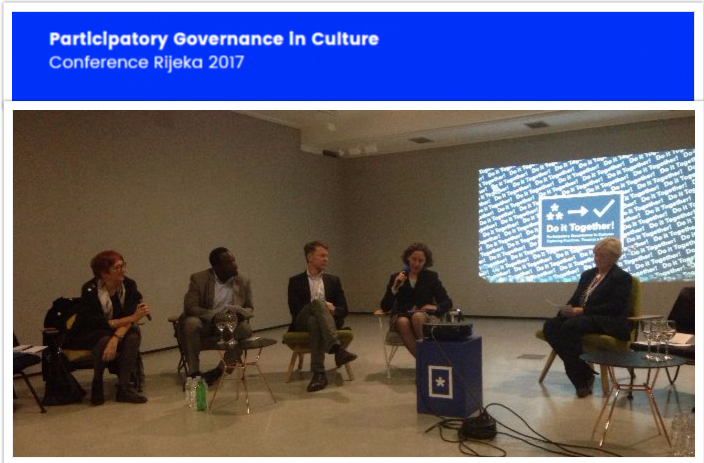The international conference Do It Together! Participatory Governance in Culture: Exploring practices, theories and policies, was held in Rijeka, European Capital of Culture 2020, 22-24 November 2017 organised by Kultura Nova. The event gathered scholars, researchers, theorists, cultural operators, artists, practitioners, activists, policy-makers, and decision makers from across the world and representing different cultural disciplines.
IFACCA’s Regional Coordinator for Europe, Dr. Diane Dodd (and president of IGCAT) chaired a panel entitled National responses to participatory agendas in culture. The session aimed to give an overview of contemporary national cultural policy rhetoric being developed across the world in relation to democratic participation in culture, institutional innovations and participatory agendas. The panellists included: Dr. Nina Obuljen Koržinek, the Minister of Culture of the Republic of Croatia; Adrian Maanka Chipindi, Director of the Arts Council of Zambia; Magnus Boström, Head of Division – Regional operations and monitoring at the Swedish Arts Council and Prof. Milena Dragićević Šešić – Head of UNESCO Chair in Studies of Interculturalism, Art and Cultural Management and Mediation in the Balkans, University of Arts in Belgrade.
A very rich discussion took place from the consideration that all forms of participation in the arts and culture are valid and essential. With different drivers and roles, whether as audiences, or participants, it is important that diverse voices are able to challenge, provoke and inspire us all the time.
Nevertheless, we need to recognise that difference structures and cultural codes show diverse forms of participation in decision making. It was clear from the panel that there is not a singular model that can fit all however there was a strong call for a toolkit of ideas on how to engage more meaningfully in participatory governance.
In conclusion, we need to continually work for a world in which arts and culture thrive and are recognised by governments and crucially peoples for their contribution to society.
IFACCA was further invited to join the final conference panel and noted that cultural context is key. Dr Dodd affirmed that participatory processes are ultimately about giving voice and listening. Creating a dialogue between those that make decisions regarding resources and support, those that create, those that will experience, and those that will respond to the creativity they experience is vital. Sharing responsibility is one of the benefits of participation in governance processes, in the formulation of arts and cultural, therefore it is not only important, it is the astute way forward.
27 November 2017
